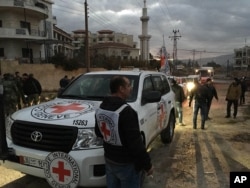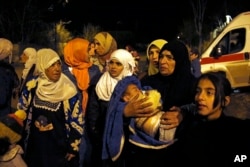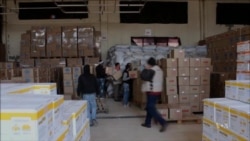The United Nations is looking into whether the man-made humanitarian calamity inside the besieged Syrian town of Madaya is a war crime or a crime against humanity.
Aid workers who got inside Madaya on Monday have seen what they call the worst sights in the nearly five-year-long civil war in Syria, including people literally starving to death in the streets.
Syrian rebels control Madaya while Syrian government forces surround the city, making escape impossible.
"We saw a people that are desperate; a people that are cold; a people that are hungry; a people that have almost lost hope that the world cares about their plight," the U.N.'s resident and humanitarian coordinator in Syria told reporters in New York via phone from Damascus.
Yacoub el Hillo said the people told him they wanted the international community to do more to have sieges lifted wherever they are being imposed in Syria.
"All parties to this conflict are exercising it [sieges], and it must stop," he added.
The U.N. says 400,000 Syrians live in areas besieged by the government, rebels or armed groups. Millions more live in areas classified as hard-to-reach for aid workers.
‘No strength to play’
Paulo Pinheiro, the head of the U.N. commission investigating war crimes in Syria, told Reuters there is acute malnutrition and starvation in Madaya among the most vulnerable members of the population.
A siege, he says, targets civilians and denies them the most basic of essentials, including food and medicine.
"Such methods of warfare are prohibited under international humanitarian law and violate core human rights obligations with regard to the rights to adequate food, health and the right to life, not to mention the special duty of care owed to the well-being of children," Pinheiro said.
The Syrian government allowed a one-time shipment of aid to Madaya on Monday.
"I am really alarmed,” Elizabeth Hoff of the World Health Organization told Reuters. “People gathered in the marketplace. You could see many were malnourished, starving. They were skinny, tired, severely distressed. There was no smile on anybody's face. It is not what you want to see when you arrive with a convoy. The children I talked to said they had no strength to play."
‘Starve-or-surrender tactics’
WHO brought in nearly eight tons of medicine, including trauma kits for the wounded, while the U.N. refugee agency trucked in food. At the same time, WHO delivered nearly four tons of medical supplies to Foua and Kafraya, two villages in Idlib province surrounded by the rebels.
U.N. officials say they expect to be able to make another delivery to Madaya in the coming days. International Red Cross officials say they are involved in "very complicated" negotiations to evacuate hundreds who need urgent medical care.
Watch video report from VOA's Zlatica Hoke:
Samantha Power, U.S. ambassador to the United Nations, fiercely condemned the Syrian regime for using what she called "grotesque starve-or-surrender tactics."
But Syrian Ambassador Bashar Jaafari told reporters Monday there is "no starvation in Madaya," rebuffing a report from the international medical charity Doctors Without Borders that 28 people in the town had starved to death.
And Russian President Vladimir Putin, Syria's most powerful ally, told Germany's Bild newspaper that the "insurgents and their foreign supporters" are responsible for civilian deaths in Syria, not the government of President Bashar al-Assad.
Putin said the rebels are trying to tear Syria apart, while Assad is trying to hold it together.
The U.N. special envoy for Syria, Staffan de Mistura, plans to meet with ambassadors from the five permanent members of the Security Council on Wednesday in Geneva.
They will likely talk about the international peace conference for Syria set for January 25.








